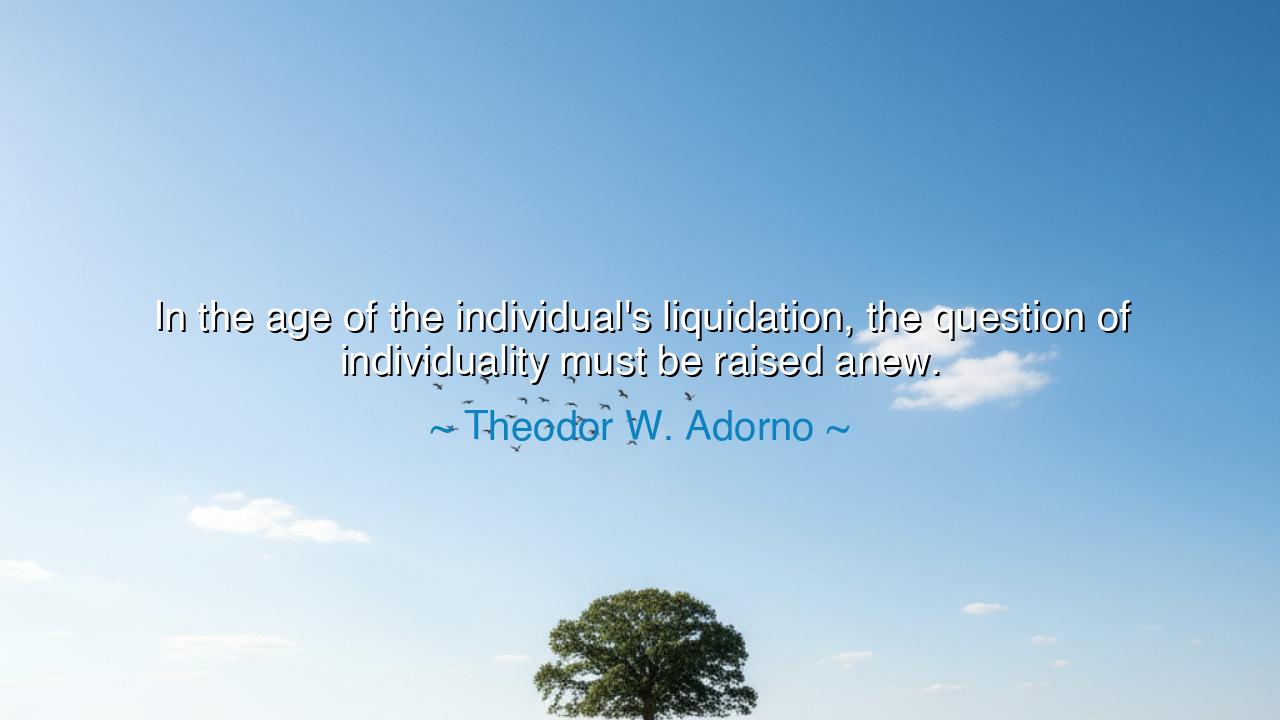
In the age of the individual's liquidation, the question of
In the age of the individual's liquidation, the question of individuality must be raised anew.






In the dawning light of human history, there existed a time when the individual was celebrated as a sovereign being, unique and free in thought and action. Yet, as the march of time presses on, the very essence of individuality—the spark that separates one soul from another—has been eroded by the currents of conformity and mass culture. In the words of Theodor W. Adorno, "In the age of the individual's liquidation, the question of individuality must be raised anew." This profound statement speaks of an era when the singular voice of the human spirit is swallowed by the collective, drowned by the machinery of society that seeks to turn each soul into a mere cog in its grand wheel. In these times, we must ask: Where does the individual stand, and what remains of the self in a world that demands conformity?
The ancient Greeks, those champions of intellectual and artistic freedom, understood the power of the individual. Figures like Socrates and Plato championed the notion of the individual’s role in shaping society through knowledge, wisdom, and virtue. To them, the individual was not an isolated fragment of society but a necessary force that contributed to the larger whole. Socrates did not conform to the laws of his city, nor did he hide his beliefs in the face of tyranny. He gave his life for his individuality, for his right to think and speak freely. It is through the individual's voice that history is often written, for it is those who refuse to bow to the collective that carve new paths for others to follow.
Yet, as time progresses, the individual becomes increasingly fragile, subject to the pressures of a society that insists on uniformity. This “liquidation” of the individual, as Adorno so aptly puts it, is not the literal death of the person, but the dissolution of their distinctiveness. Think, if you will, of the rise of mass consumerism, where people are encouraged to consume not for their personal needs or desires, but to fill a role in a grand machine. The individual is no longer a creator or a thinker, but merely a participant in the grand dance of the collective. The corporate world, for instance, molds its workers into interchangeable parts, each person a nameless face in the vast sea of productivity. The power of choice and the freedom to create are slowly suffocated by the demand for conformity and compliance.
The heroism of the individual, however, has not disappeared entirely. We see this in the defiance of those who resist the pull of the collective. Mahatma Gandhi, a man of humble origins, understood this deeply. He fought not with weapons, but with the strength of his individuality, choosing nonviolence as his weapon and self-reliance as his creed. Gandhi's struggle against British rule was a battle not only for Indian independence but for the sovereignty of the individual spirit. He resisted the forces of imperialism and the pressures to conform, standing as a beacon of personal integrity and moral conviction. Through his individuality, Gandhi changed the course of history, showing that the true power of a people lies in their ability to retain their individuality in the face of overwhelming pressure.
In our own time, we must ask: Are we, like the individuals of ancient times, capable of resisting the forces that threaten our individuality? In the face of overwhelming societal pressures, how can we safeguard the self from being consumed by the tides of conformity? The answer lies in awareness and courage. As Adorno suggests, we must revisit the question of individuality—not as a luxury, but as a fundamental necessity for the survival of the human spirit. The loss of individuality is the loss of our identity, the soul of what it means to be human. We must reclaim our right to think for ourselves, to speak our truths, and to walk our own path, no matter how narrow or difficult the road may seem.
Let us take action, then, to protect the essence of who we are. The path to reclaiming our individuality begins with self-reflection—an understanding of who we are, apart from the roles and labels imposed by society. We must embrace the power of creativity and self-expression, for it is through these channels that we give life to our inner truths. Like the great thinkers, leaders, and rebels of history, we must hold fast to our beliefs, even when the winds of popular opinion blow against us. Let the question of individuality be raised anew in our hearts and minds, and let us walk forward as individuals who are not afraid to stand alone, for it is in this solitary strength that we truly live.
The lesson, then, is clear: The individual is not a passing relic of a bygone age, but the heartbeat of the human spirit. To lose the individual is to lose the essence of life itself. Let us, therefore, preserve the flame of individuality in our own lives, for it is only through the expression of our unique voices that the world can be made rich and diverse. Adorno’s words remind us that in the age of liquidation, we must rise, as individuals, and reclaim our birthright: the freedom to think, to act, and to live as ourselves, undistorted by the forces that seek to dissolve us into the mass.






AAdministratorAdministrator
Welcome, honored guests. Please leave a comment, we will respond soon